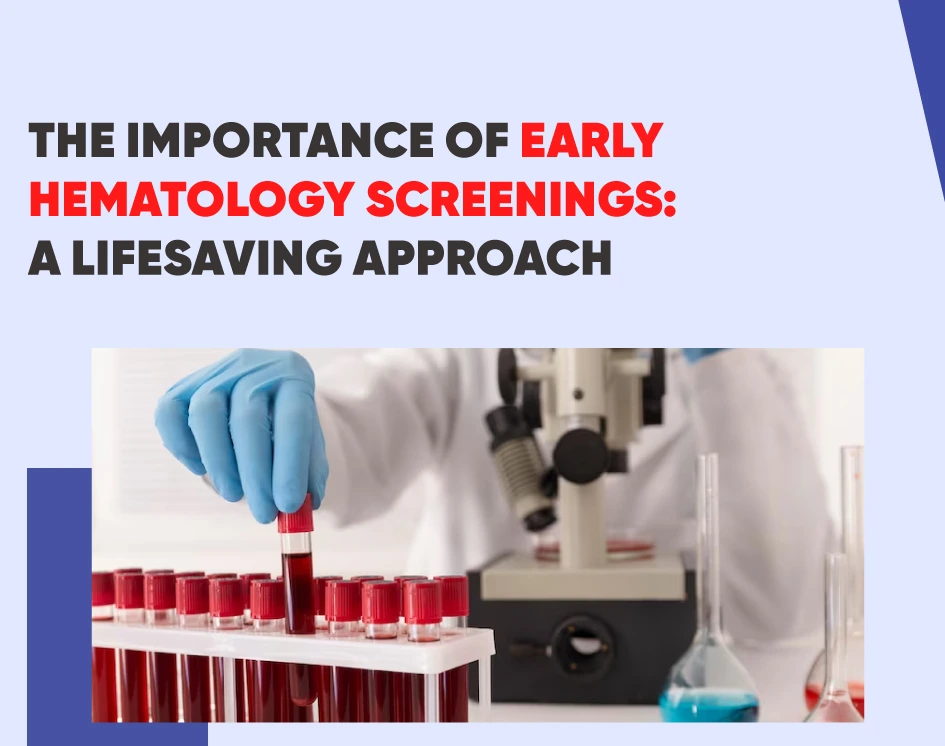
The Importance of Early Hematology Screenings: A Lifesaving Approach
Blood, the life-sustaining fluid coursing through our veins, serves as the body’s transport system, carrying oxygen, nutrients, and vital components while also removing waste. It’s a complex, multifunctional entity that requires vigilant monitoring. The study of blood and its disorders falls under the purview of hematology, a field crucial in safeguarding our health.
Understanding Hematology
Hematology delves into the intricate workings of blood, from red and white blood cells to platelets and the components governing clotting and hemostasis. A hematologist, armed with specialized knowledge, plays a pivotal role in diagnosing and treating blood-related conditions. These conditions can range from anemias and bleeding disorders to life-threatening blood cancers.
Healthcare providers adopt a multipronged approach to managing blood disorders. They address symptoms while tackling the root causes, aiming to restore patients’ health and well-being.
The Spectrum of Blood Disorders
Conditions related to the blood cover a broad range, including both harmless and harmful ones, which can upset the body’s balance. Among the severe cases are blood cancers like Leukemia, Lymphoma, and Myeloma. These diseases start in the blood or bone marrow and usually need intense care.
- Leukemia is a malignant systemic disease of the red bone marrow in which normal white blood cells are replaced by abnormal ones. Abnormal leukocytes do not execute their role but continue to divide vigorously, resulting in a rise in their quantity. They travel through the circulation and produce pathological alterations in the tissues of all hematological organs.
- Lymphoma is a kind of cancer that affects immune cells. Lymphocytes grow to enormous proportions, divide uncontrolled, and impact the lymphatic system: lymph nodes, bone marrow, and the thymus gland. Lymphoma differs from other oncological illnesses in that it spreads throughout the body: degraded malignant cells invade the internal organs and severely damage their functioning. For a long period, the condition remains asymptomatic, and when it does appear, the entire body is frequently afflicted. Most lymphomas have a progressive history and a high malignancy with metastases. However, if they are found early, the prognosis improves to 90%.
- Myeloma, arising from plasma cells in the bone marrow, is another formidable adversary. Managing Myeloma, including its precursor condition MGUS, requires specialized care.
The Haematology Unit also treats a wide range of non-cancerous disorders, including:
- Myeloproliferative Disorders (MPDS) – MPDS are classified into three types: Essential Thrombocythaemia, Polycythaemia Vera, and Myelofibrosis. These disorders impact the number of blood cells generated in our body.
- Myelodysplastic Syndrome (MDS) is a blood condition in which the number of healthy blood cells decreases.
The Importance of Early Hematology Screenings
Despite the profound impact of blood disorders on overall health, the significance of early hematology screenings often goes unnoticed. These screenings serve as a vital tool in disease detection, offering valuable insights that facilitate timely intervention. Sadly, many individuals delay or overlook these screenings, unknowingly putting their health at risk.
Hematology screenings encompass a comprehensive battery of tests, evaluating various blood parameters, including red blood cells, white blood cells, platelets, and other components. The results furnish a comprehensive picture of one’s health and can unveil potential issues before they escalate. These screenings aren’t just an optional component of healthcare; they are an integral part of routine check-ups. Healthcare providers routinely recommend them to identify early signs of diseases and initiate appropriate treatment promptly.
Who Should Undergo Early Hematology Screenings?
Early hematology screenings are not limited to a specific age group or demographic. They benefit individuals of all ages, especially those with specific risk factors, including:
Family History: If you have a family history of blood disorders or blood cancers, you should prioritize regular hematology screenings. Genetic predispositions can significantly increase your risk.
Age: Advancing age often correlates with an elevated risk of blood-related conditions. As we grow older, regular screenings become increasingly vital.
Chronic Illnesses: Individuals grappling with chronic conditions like diabetes or kidney disease face an augmented risk of blood-related complications. Hematology screenings can provide early warning signs and facilitate timely intervention.
Medication Usage: Certain medications may impact blood cell counts. If you’re on long-term medication, consult your healthcare provider about the necessity of regular screenings.
Unexplained Symptoms: Experiencing persistent symptoms like fatigue, unexplained bruising, or prolonged bleeding warrants immediate attention. These could be indicative of an underlying blood disorder that necessitates prompt evaluation.
Preparing for a Hematology Screening
Preparing for a hematology screening is a straightforward process that involves a few essential steps:
Consult Your Doctor: Initiate a conversation with your primary care physician to discuss your concerns and risk factors. They will recommend the appropriate screening tests tailored to your unique needs.
Fasting May Be Required: Depending on the tests prescribed, you may need to fast for a specific duration before the screening. Adhere to your healthcare provider’s instructions meticulously.
Stay Hydrated: Adequate hydration ensures accurate results. Drinking ample water in the lead-up to your screening is advisable.
Inform Your Healthcare Provider: Be transparent about any medications, supplements, or herbal remedies you’re taking. These can influence the test results and guide your healthcare provider in making an accurate assessment.
Stay Relaxed: Hematology screenings are generally quick and painless. Maintain a relaxed demeanor during the process to ensure an efficient and accurate evaluation of your blood’s health.
In conclusion
The importance of early hematology screenings cannot be overstated, as they serve as a crucial tool in maintaining good health. Blood disorders can affect anyone, making regular screenings essential. However, the key to making the most of these screenings lies in seeking guidance from a professional hematology expert. Hematologists possess specialized knowledge and experience to accurately interpret screening results and provide personalized care if needed. If you’re worried or have a family history of blood problems or strange blood-related symptoms, it’s smart to see a healthcare expert. When they suggest it, trusting a trained hematologist is important. Your health is valuable, and relying on a blood specialist can save your life.








